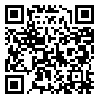Volume 14, Issue 2 (Summer 2019 2019)
jmed 2019, 14(2): 74-82 |
Back to browse issues page
Download citation:
BibTeX | RIS | EndNote | Medlars | ProCite | Reference Manager | RefWorks
Send citation to:



BibTeX | RIS | EndNote | Medlars | ProCite | Reference Manager | RefWorks
Send citation to:
Keshmiri F, Heydari A S. Evaluating the Students Assessment in Residency Program Based on Competency Based Approach. jmed 2019; 14 (2) :74-82
URL: http://jmed.ssu.ac.ir/article-1-972-en.html
URL: http://jmed.ssu.ac.ir/article-1-972-en.html
PhD, Assistant Professor, Educational Development Center, Shahid Sadoughi University of Medical Sciences, Yazd, Iran. Assistant Professor, Medical Education Department, Faculty of Health, Shahid Sadoughi University of Medical Sciences, Yazd, Iran , keshmiri1395@gmail.co
Abstract: (4996 Views)
Objectives: The present study aimed to evaluate the evaluation process in educational groups based on a competency-based approach.
method:
In this study, the evaluation of the program is based on a competency-based approach. For this purpose, the first stage of the evaluation was formulated as a (work sheet). Then, Blurinett developed a comprehensive assessment with an emphasis on a competency-based approach. In the third step, you will find a list of evaluations and related tools and will be placed in the final panel.
Assessing the evaluation of the assisstance groups by observing the site (site visit) was done using checklist and interviews with the educational authorities of the community.
findings:
According to the evaluation, it was found that 80% of the training groups have a 100% developmental test in the functional domain and in the cognitive domain (at low levels). But in the field of reasoning and attitude, only 6.6% of the educational groups use developmental tests.
On average, 83% of the competencies are measured in clinical education groups. Considering the importance of evaluating all competencies during the years of study, this should attract the attention of the instructors of the educational systems and emphasize the assessment competencies through appropriate tools.
The results of the assessment of the overall assessment status indicate that the highest frequency with respect to the MCQ test method is in the 100% of the group. The test station has been used 92.9% in the second level, although the observation of objective, structured test methods such as OSCE has not been reported in any of the training groups. The third level is Logbook, which has been used electronically in all assisstance groups.
Conclusion:
Considering the importance of empowerment assessment in clinical education groups, it is necessary to plan and implement important measures in the resident groups. It is also recommended to plan for empowering faculty members and create the necessary infrastructure to monitor the usefulness of the tests, monitor the quality of comprehensive assessment programs and develop a competency-based approach to the process in the assistant education groups.
method:
In this study, the evaluation of the program is based on a competency-based approach. For this purpose, the first stage of the evaluation was formulated as a (work sheet). Then, Blurinett developed a comprehensive assessment with an emphasis on a competency-based approach. In the third step, you will find a list of evaluations and related tools and will be placed in the final panel.
Assessing the evaluation of the assisstance groups by observing the site (site visit) was done using checklist and interviews with the educational authorities of the community.
findings:
According to the evaluation, it was found that 80% of the training groups have a 100% developmental test in the functional domain and in the cognitive domain (at low levels). But in the field of reasoning and attitude, only 6.6% of the educational groups use developmental tests.
On average, 83% of the competencies are measured in clinical education groups. Considering the importance of evaluating all competencies during the years of study, this should attract the attention of the instructors of the educational systems and emphasize the assessment competencies through appropriate tools.
The results of the assessment of the overall assessment status indicate that the highest frequency with respect to the MCQ test method is in the 100% of the group. The test station has been used 92.9% in the second level, although the observation of objective, structured test methods such as OSCE has not been reported in any of the training groups. The third level is Logbook, which has been used electronically in all assisstance groups.
Conclusion:
Considering the importance of empowerment assessment in clinical education groups, it is necessary to plan and implement important measures in the resident groups. It is also recommended to plan for empowering faculty members and create the necessary infrastructure to monitor the usefulness of the tests, monitor the quality of comprehensive assessment programs and develop a competency-based approach to the process in the assistant education groups.
Type of Study: case report |
Subject:
Medical Education
Received: 2018/12/5 | Accepted: 2019/04/14 | Published: 2019/08/14
Received: 2018/12/5 | Accepted: 2019/04/14 | Published: 2019/08/14
Send email to the article author
| Rights and permissions | |
 |
This work is licensed under a Creative Commons Attribution-NonCommercial 4.0 International License. |







